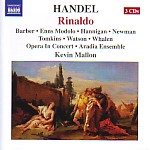If it weren’t for the two other complete (and one cut to ribbons, hardly historically informed, but worthy) and quite superb recordings of this juicy, thrilling opera–Handel’s first for London, and the one that made him a star in that city–this new, inexpensive set, as performed by the Canadian group Opera in Concert, would be greeted wildly. As it is, it has plenty to recommend it despite the star power of its competition.
The others, on Decca and Harmonia Mundi (and Nuova Era), feature the likes of Vivica Genaux, David Daniels, Cecilia Bartoli, Bernarda Fink, Luba Orgonasova, and Gerard Finley (and Marilyn Horne and Cecilia Gasdia), and are dramatically urgent and brilliant, particularly the one led by René Jacobs on HM. But let’s put them aside and deal with this present recording.
Opera in Concert apparently is the company’s name; the band–17 string players, 11 wind and brass players, and four continuo players–is the Aradia Ensemble, a lively, more-than-proficient group of period instrumentalists who under Kevin Mallon play the heck out of Handel’s colorful, ever-changing score and can be compared with the finest ensembles around. The obbligato oboist, harpsichordist, and sopranino recorder virtuoso (in Almirena’s gorgeous first-act “bird” aria) are superb. Mallon doesn’t go for fierce string attacks, which I prefer, but every bit of his leadership has spring and energy, and he and his cast are particularly careful with the recitatives, which are dramatically put forth.
While I don’t mind the role of Rinaldo being taken by a mezzo rather than a countertenor (Horne is a knockout, but so is David Daniels), Mallon is clearly allergic to the countertenor voice, and he does some damage by giving the role of Eustazio to yet another mezzo, and even more damage by re-scoring the small but fascinating part of the Christian Magician from male alto to baritone. The otherworldly effect is lost if the voice is so grounded.
The cast is uniformly good. Everyone embellishes the vocal line with skill and ease, and if Armida’s ornaments are a bit wild, well, so is the character. Kimberly Barber is fine as Rinaldo. Her voice is well-knit and there are no weaknesses; she has everything but charisma. Much the same might be said of Laura Whalen’s Almirena. Her voice is lovely–pristine but not white–and she sings handsomely. But having heard Cecilia Bartoli and Ileana Cotrubas in the role, it’s easy to hear how alluring this character should be, and Whalen misses by a bit. I’m nit-picking, but the competition is fearsome.
The Argante of baritone Sean Watson is exciting and aggressive, and his agility and diction are impeccable; he’s in league with the best. Barbara Hannigan’s Armida is nicely teeth-gnashing, she sings the heck out of her arias and duets, and her recits are delivered with real fire. Marion Newman’s Goffredo is authoritative and fluid, and despite my antipathy to the casting issue, Jennifer Enns Modolo does well by Eustazio’s music. In brief, this remains third choice, after Jacobs and Hogwood (Decca), but the fact that it is half the price of the others makes it a very close third.
































